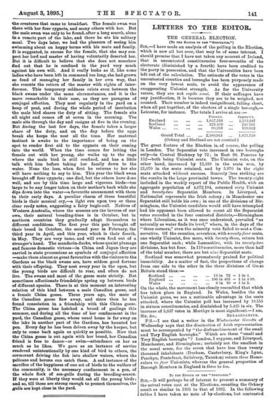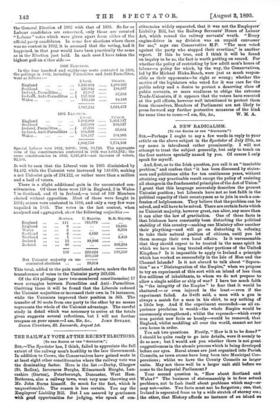TO THE EDITOR OF THE " SPECTATOR."
Sia,—It will perhaps be of interest to present a summary of the actual votes cast at the Elections, counting the Orkney result as similar in 1895 to that of 189:2. In the following tables I have taken no note of by-elections, but contrasted the General Election of 1892 with that of 1895. So far as Labour candidates are concerned, only those are counted "Labour" votes which were given apart from either of the official party candidates. In some few elections where there was no contest in 1892, it is assumed that the voting, had it happened, in that year would have been practically the same as in the Election just held. In each case I have taken the highest poll on elther side :—
1S92 ELECTION.
In the four hundred and eighty-one seats contested in 1895, the pollings in k92, including Parnellites and Anti-Parnellites, -were as follows :—
England ... ...
Scotland ...
Irelan,l, Parnellites...
I relarid, Ant i-Parnellites Wales ..• ... L'heral.
1,349,604 236,846 ( 43,981 t 117,359 139,416 Unionist.
1,288,930 194,037
57,352 64,14S
1,387,242 1,624,473 1895 ELE".2TION.
L bera!, Un'on'st.
England ... 1.282,980 1,402,127 Scotland 229,018 210,127 Ireland, Parnellites... ( 47,580 56,864 Ireland, Anti-Parnellites t 104,999 Wales... 138,167 104,985 1,502,750 1,774,103
Special Labour vote 1892, 9,636; 1895, 36,729. The aggregate vote of the constituencies contested in 1805 was 3,613,5S2; the same constituencies in 1892, 3,521,401—net increase of voters, 92,181.
It will be seen that the Liberal vote in 1895 diminished by 84,492, while the Unionist vote increased by 149,630, making
a net Unionist gain of 234,122, or rather more than a million and a half of voters.
There is a slight additional gain in the uncontested con- stituencies. Of these there were 119 in England, 2 in Wales, 7 in Scotland, and 61 in Ireland,—a total of 189 Members elected without opposition. Most of these were fought in 1692; others were contested in 1886, and only a very few were unpolled in 1835. The votes in the last contest, when analysed and aggregated, show the following majorities :— Membeis.
En gland 111
U. Majority. H.-R. Majority.
185,879 England 8
19,885 Wales 2
8,594 Scotland 6 4,859
Scotland 1
2,413 Ireland 15 38,836
Ireland •.. 46
169,218 189 229,624 200,110
200,110
Net Unionist majority on un-
contested elections ...
29,514
This total, added to the gain mentioned above, makes the full transference of votes to the Unionist party 263,636.
Of the 454 pollings (save two-membered constituencies) 17 were struggles between Parnellites and Anti - Parnellites. Omitting these it will be found that the Liberals reduced the Unionist majorities or increased their own in 74 instances, while the Unionists improved their position in 363. The transfer of 90 seats from one party to the other by no means represents the whole of the Unionist advantage. The careful study in detail which was necessary to arrive at the totals given suggests several reflections, but I will not further trespass on your space.—I am, Sir, Sec., JOHN STUART. Saxon Chambers, St. Leonards, August 1st.



































 Previous page
Previous page